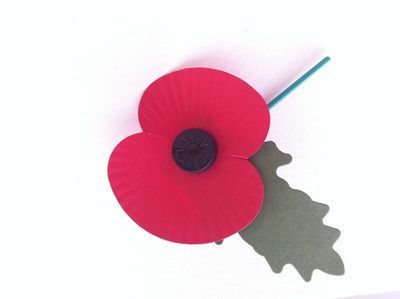Poppy wars
Rarely does Fleet Street speak with one voice, but on the vital matter of the poppy and the England shirt, there seems to be consensus. In case you missed it, or assumed that what England and Wales footballers wore on their shirts was a matter of overwhelming triviality, I'll fill you in. At a couple of international friendly matches to be played over this weekend, the governing bodies of English and Welsh football have requested that the world governing body, FIFA, allow the players to appear with poppies embroidered into their shirts. FIFA have refused the request, on the grounds that their rules specifically stipulate that players' shirts should not carry political or religious messages, and that to make an exception would "jeopardise the neutrality of football".
Cue outrage.
"Rat Blatt snubs poppies", said the Sun (Sepp Blatter is the head of FIFA). "FIFA's Poppy ban shows lack of respect" was the Mirror's more sober take. The Guardian chose to point out that the "Fifa ban on England's poppy kit was condemned by war veterans", while the Telegraph reported that the Prime Minister, David Cameron, had called the ban "ridiculous". As the UK sports minister explained, "it is not religious or political in any way. Wearing a poppy is a display of national pride."
Leaving aside the debatable idea that displaying national pride is a non-political act, I wonder how so many have convinced themselves that the poppy should be an exception. Its origins lie in the work of one of the most controversial figures of the First World War, Earl Haig, whose work for the Royal British Legion raised money for veterans and commemoration. This work has often (though probably wrongly) been seen as Haig's way of restoring his good name among those who thought his strategic approach put no value on servicemen's sacrifice. Supporting veterans and remembering the fallen were and are admirable national causes, but they are hardly non-political ones. You don't have to be Clausewitz to think that fighting wars, and the consequences of fighting wars, are political acts. They don't become non-political just because they are in the past. You only have to go to Northern Ireland to see that wearing a poppy is a deeply political act, one which will be met with approval in the Shankill Road and which is inadvisable, to put it mildly, in the Falls Road.
This is, understandably, an emotive issue, but that's why governing bodies and rules exist, so that emotions do not guide decisions. I should probably say that I wear a poppy myself and would encourage others to do so, but FIFA is absolutely right not to relax its rules. Too often the British assume they are exceptional. Our Empire was better than everybody else's, we go to war for noble reasons, we play fair. The howls of outrage that greet any challenge to such notions are noises to distract attention, not arguments that we should take seriously. The poppy is a deeply ingrained political (and quasi-religious) symbol, which marks the sacrifice of men and women in the cause of one of the purest political expressions of national interest: the preservation of the nation through waging war.
Peter Stothard's Blog
- Peter Stothard's profile
- 30 followers




